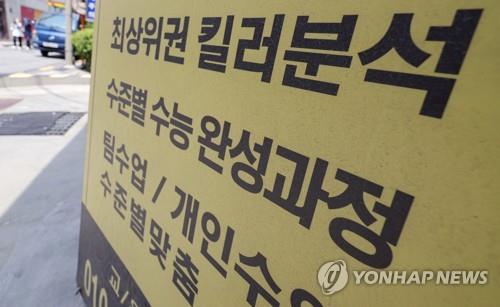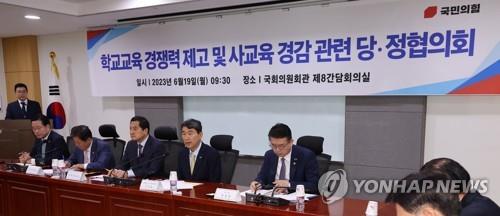- California Assembly OKs highest minimum wage in nation
- S. Korea unveils first graphic cigarette warnings
- US joins with South Korea, Japan in bid to deter North Korea
- LPGA golfer Chun In-gee finally back in action
- S. Korea won’t be top seed in final World Cup qualification round
- US men’s soccer misses 2nd straight Olympics
- US back on track in qualifying with 4-0 win over Guatemala
- High-intensity workout injuries spawn cottage industry
- CDC expands range of Zika mosquitoes into parts of Northeast
- Who knew? ‘The Walking Dead’ is helping families connect
Gov’t to exclude ‘killer’ questions from college entrance exam: presidential office
The government will exclude extremely difficult “killer” questions from the annual college entrance exam starting this year in an effort to reduce private education expenses, the presidential office said Monday.
The state-administered College Scholastic Ability Test (CSAT), known as Suneung in Korean, has faced criticism for including killer questions that many say students without tutoring from private cram schools, known as “hagwons” in Korean, are unable to solve.
“If we want to enter a good university, we need to be able to solve these killer questions, and if we are going to do so, we need to first go to hagwons,” a senior presidential official told Yonhap News Agency. “This is such an abnormal situation.”

The CSAT has emerged as one of the hottest issues in South Korea after the office of President Yoon Suk Yeol unveiled his instruction last week that what is not taught at schools should be excluded from the exam.
The instruction sparked confusion over how easy or difficult this year’s exam will be at a time when the test is just five months away, though Yoon’s office later clarified that his instruction did not mean making the exam easier.
In recent years, the CSATs have featured several killer questions, some of which are based on university curricula, allowing the private education sector to profit significantly by providing strategies to solve such questions.
According to the senior presidential official, who spoke on the customary condition of anonymity, Yoon has stressed to aides that including such questions on the CSAT is “inappropriate” and “unfair” and amounts to “playing tricks” on children.
Officials said that since March, Yoon has pointed out the high difficulty level of the CSAT as a possible factor in the steady increase in private education expenses and ordered that such questions be excluded from mock CSAT tests.
However, a recent mock test conducted in June included a number of killer questions and was reportedly not as easy as expected. A high-ranking education ministry official in charge of the CSAT was replaced last week, apparently for failing to adjust the difficulty level of the exam.
“It is possible to set sufficiently discriminatory questions within the curriculum,” the presidential official said, adding that a mock CSAT scheduled for September will exclude such killer questions.
Also Monday, the head of the Korea Institute for Curriculum and Evaluation, the state-funded agency responsible for administering the exam, said he will resign from the post.
“I have decided to resign to take responsibility for the agency chief in relation to a mock test in June,” Lee Kyu-min said in a press release. Lee, whose term ends in Feb. 2025, was appointed under the previous administration.
The CSAT, held on the third Thursday of November every year, is one of the nation’s most important academic events, as it is the culmination of years of hard work for many students anxious to enter top universities.
Education Minister Lee Ju-ho also said in a policy consultation meeting with the ruling People Power Party (PPP) at the National Assembly that exam questions covering material not taught in public education will be excluded.
“This marks the beginning of normalizing public education and reducing private education expenses,” he said.
Regarding the opposition party’s criticism that the government is causing confusion among students and parents, the PPP once again clarified that Yoon’s remarks are aimed at establishing a “fair CSAT.”
The two sides also agreed to explore alternative approaches to writing exam questions in a way that is based on public education but does not make them too easy.
To alleviate the financial burden of private tutoring on households, the government plans to expand support for EBS, which provides high school tutoring lessons through TV, radio and the internet for free, as well as support for other after-school programs.
Meanwhile, the government and the PPP agreed to keep three types of elite high schools in place, after scrapping the previous administration’s plan to convert all autonomous private, foreign language and international high schools into general high schools starting in 2025.
The education ministry is scheduled to first announce ways to beef up public education Wednesday and a set of measures to reduce private education spending on June 27.












